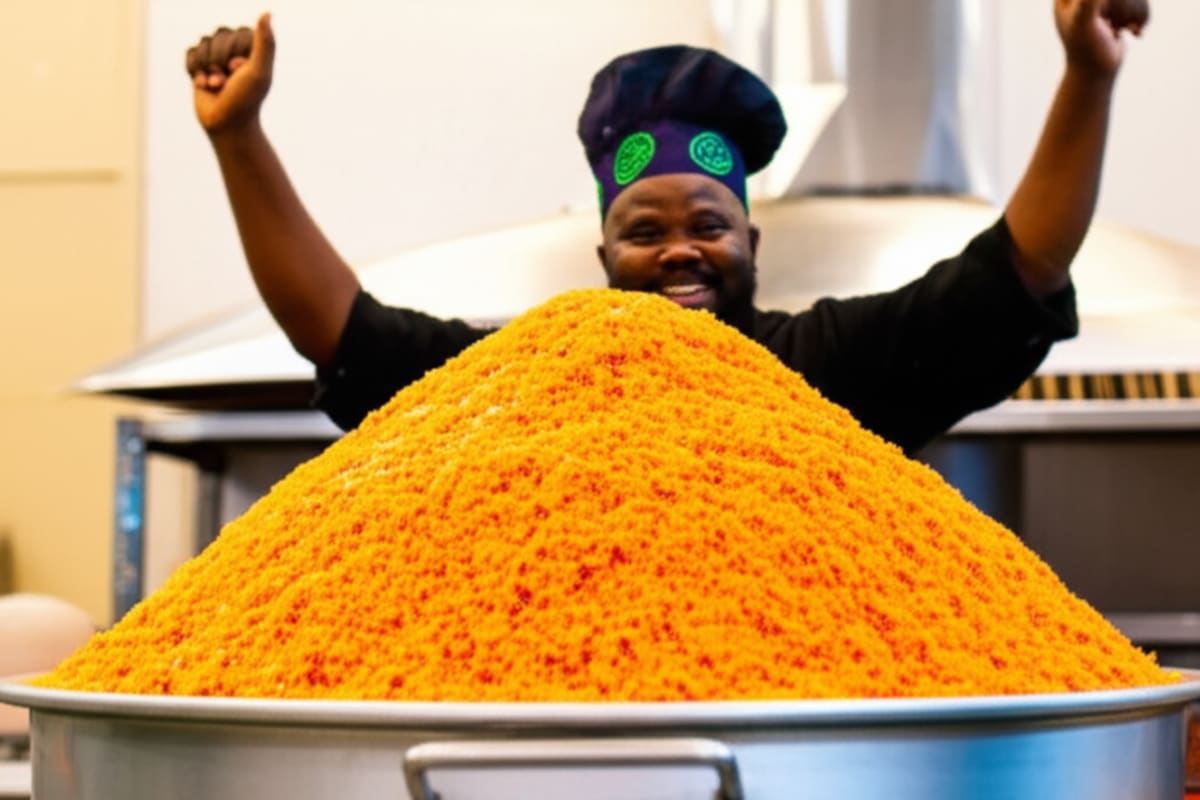Nigerian Chef's Jollof Rice Breaks World Record!

A Nigerian chef has officially etched their name into the Guinness World Records, achieving a monumental culinary feat by creating a jollof rice dish weighing a staggering 8,780 kilograms (approximately 19,357 pounds)
Background
This remarkable achievement far surpasses any previous attempts, showcasing not only exceptional culinary skill but also the immense popularity and deep-rooted cultural significance of jollof rice, a beloved staple across West Africa
The ambitious undertaking, which undoubtedly involved meticulous planning, substantial resources, and a dedicated team of culinary professionals and support staff, underscores the immense dedication and logistical prowess required to break such a significant record
A Culinary Feat with Global Implications: For readers in Southeast Asia and beyond, this accomplishment offers a captivating glimpse into a distinct culinary tradition. While Southeast Asia boasts a rich and diverse tapestry of rice dishes, from fragrant jasmine rice preparations like Nasi Lemak to sweet and savory sticky glutinous rice delicacies such as Mango Sticky Rice, the preparation, presentation, and cultural context of jollof rice differ significantly. Jollof rice, typically prepared as a flavorful one-pot dish, is immediately recognizable by its vibrant reddish-orange hue, derived from a careful blend of tomatoes, peppers, and tomato paste, along with the inclusion of various meats (often chicken, beef, or goat) and vegetables. This contrasts with some Southeast Asian rice dishes, which might emphasize the use of coconut milk, a wider array of fresh herbs and spices, and different cooking techniques, highlighting the unique regional variations in rice-based cuisine.
The Immense Scale of the Achievement: The sheer scale of this achievement is truly noteworthy. An astounding 8,780 kilograms of rice represents a considerable quantity of food, enough to potentially feed thousands of people. The logistics involved in sourcing the vast quantity of high-quality ingredients, meticulously cooking the dish in a manner that ensures even cooking and consistent quality throughout, and then safely and efficiently serving such a massive portion would have presented immense challenges. This accomplishment underlines not only exceptional culinary expertise but also a significant feat of organizational and logistical planning, showcasing the chef's ability to manage large-scale operations and coordinate a dedicated team.
Beyond the impressive weight of the dish itself, the record-breaking jollof rice achievement highlights the growing global interest in Nigerian cuisine and African food culture in general
This milestone provides a valuable platform to showcase the remarkable diversity and richness of African culinary traditions, and it has the potential to spur further exploration and appreciation of Nigerian and West African food beyond its regional boundaries
The event may also contribute to boosting tourism to Nigeria, as culinary tourism becomes an increasingly significant segment of the global travel industry, attracting visitors eager to experience authentic flavors and cultural experiences
Considerations and Criticisms: However, a balanced perspective also requires considering potential criticisms and addressing relevant ethical considerations. Some may question the sustainability of such a large-scale cooking event, particularly concerning the vast quantities of resources consumed and the potential for food waste if the entire quantity is not efficiently distributed and consumed. Further investigation into the event's environmental impact and sustainability practices, including sourcing methods and waste management protocols, would be beneficial. It's also important to consider the social impact and ensure that the event benefited the local community in a meaningful way.
Furthermore, it's crucial to acknowledge the cultural sensitivity and friendly rivalry surrounding jollof rice.
The dish is often the subject of passionate debate and playful competition between different West African nations, each claiming their version as the most authentic and superior
The record-breaking feat, while undoubtedly celebrated by Nigerians, might also spark good-natured banter and humorous challenges within the wider West African culinary community, adding a vibrant and engaging layer to the story that transcends the mere breaking of a record
This friendly rivalry underscores the deep cultural significance of jollof rice and its role as a unifying symbol of West African identity
Conclusion: A Testament to Culinary Passion
In conclusion, the Nigerian chef's remarkable achievement is a powerful testament to culinary passion, unwavering dedication, and remarkable ingenuity.
It offers a valuable opportunity to appreciate the incredible diversity of global cuisines and prompts a deeper understanding of the cultural significance of food and the immense challenges of undertaking such large-scale culinary feats
The long-term impact of this event on Nigerian tourism and global perceptions of Nigerian cuisine remains to be seen, but it's undoubtedly a remarkable and inspiring story that deserves recognition and celebration
